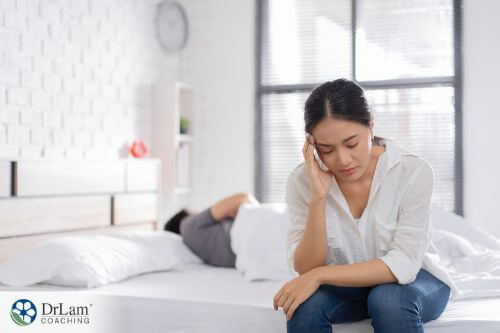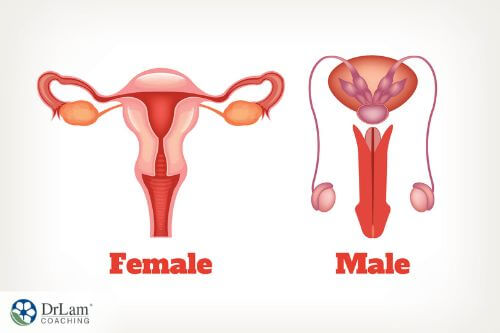 Everyone has periods when they are not as interested in sex. This is normal, and it's also normal to sometimes have less interest than your partner. But if you have low libido for a long time, it could indicate some underlying issues that may need your attention. This can be the kind of problem you might hesitate to see your doctor about. However, this is important to ensure that there aren’t any medical causes. Once you have an idea of the root causes, there are things that you can do about raising your libido so you can start enjoying your sex life again.
Everyone has periods when they are not as interested in sex. This is normal, and it's also normal to sometimes have less interest than your partner. But if you have low libido for a long time, it could indicate some underlying issues that may need your attention. This can be the kind of problem you might hesitate to see your doctor about. However, this is important to ensure that there aren’t any medical causes. Once you have an idea of the root causes, there are things that you can do about raising your libido so you can start enjoying your sex life again.
For many people, a healthy sex life is an essential part of life. But unfortunately, there are many things that can cause a low libido. This is defined as a decreased interest in sexual activities. Obviously, this is very subjective, as everyone’s libido is different, so it depends on your original level of interest in sexual activities.
Men, in particular, can be impacted by having a lowered libido, as virility tends to play a big role in the societal concept of manhood. However, it can also affect women.
It’s normal to lose interest in sex now and then when you’re stressed, have a lot going on, and at different periods of your life. However, losing your libido can also be a sign of underlying health conditions and can impact your quality of life and relationships. This is when you need to take action.
Having a low libido can have a large impact on your life, particularly for men. It can cause a cycle of physical and emotional side effects like:
This is why, whether you’re a man or a woman, it’s important to you see your doctor about any libido problems you’re experiencing.
There are a number of issues that can cause a low libido including:
Testosterone is a male hormone that governs the libido in both men and women. It also helps to build muscle and bone and stimulates sperm production in men. Testosterone levels vary from person to person. They also naturally drop with age. But in both genders, dropping testosterone levels can severely impact your desire for sex.
Certain medications can also lower your testosterone levels, leading to a low libido. Some medications that have this effect are:
If you’re taking any of these medications and you're experiencing changes in your libido, then talk to your doctor about making changes.
 If you have depression then you may experience a total lack of interest in everyday activities, including sex. The medications you take for depression can also impact your testosterone levels. Medications that can do this are:
If you have depression then you may experience a total lack of interest in everyday activities, including sex. The medications you take for depression can also impact your testosterone levels. Medications that can do this are:
If you’re having problems in your relationship, then it will naturally affect your interest in sex. Some relationship issues that could cause your loss of sexual desire are:
There are certain physical issues that can make sex difficult and even painful, resulting in a low sex drive. Some sexual issues that can cause a low sex drive are:
Sleeping problems like sleep apnea can also decrease testosterone levels and lower your libido. Some studies have also shown that sleeping less than normal can also cause decreased testosterone levels.
Too much or too little exercise can also cause a low sex drive. Too little exercise can bring on health problems that affect sexual desire such as obesity, type 2 diabetes, and high blood pressure. And too much exercise can also lower your libido by excessively stressing your body systems.
In contrast, regular, moderate exercise can help to lower cortisol levels and stress levels, which will have a positive impact on your sex drive.
Feeling unwell because of chronic illnesses can also lower your desire for sex. And other chronic illnesses, such as cancer, can reduce sperm production in men and have a long-term impact on your libido.
Chronic issues that may impact your libido include:
Stress because of relationships, work, environmental, or health issues can have a direct impact on your libido. Stress can disrupt your hormone levels and put many other organ systems on overdrive, which can lower your interest in sex. It can also reduce your energy levels.
Testosterone levels naturally drop as you age, which lower sexual arousal and desire levels in both men and women. In women, the hormone changes that occur with menopause can also affect their levels of sexual desire
Drinking more than 14 mixed drinks a week has been shown to lower testosterone production. And drinking heavily over a long period can have an impact on your sex drive over the long term.
Other drugs such as marijuana, tobacco, and illegal drugs can also lower your testosterone production.
People with RLS feel the uncontrollable urge to move their legs at night, which can disrupt their sleep. This condition is also strongly associated with erectile dysfunction as well as impotence in men.
 Thinking badly about yourself, having little confidence, or disliking your body takes a toll on your emotional and mental health. It may cause mood issues like anxiety or depression, and also makes you less likely to feel comfortable in sexual situations, all of which are contributes to a low libido.
Thinking badly about yourself, having little confidence, or disliking your body takes a toll on your emotional and mental health. It may cause mood issues like anxiety or depression, and also makes you less likely to feel comfortable in sexual situations, all of which are contributes to a low libido.
Pregnancy, giving birth, and breastfeeding can cause a number of issues that may impact your sex drive. Some of these issues include:
It’s important that you don’t let any embarrassment stop you from seeking out help for a low libido. However, issues that affect your libido can be complicated, so you might find it hard to decide what kind of professional to see.
Here’s a guide to who you should see to get help with your libido:
There are some easy strategies you can do at home to correct a low libido. Make sure you visit your doctor first, to check whether there are any serious medical issues that may be causing the issue. But these strategies can also help rev up your libido again such as:
One common, overlooked problem in the modern world is chronic stress, which can lead to Adrenal Fatigue Syndrome (AFS). This disorder can occur when you’re under long term stress, causing imbalances in the NeuroEndoMetabolic (NEM) stress response. And it can be a major cause of low libido and many of the causes of low libido, like hormone imbalances and chronic health problems.
The NEM stress response turns on when your cortisol levels rise because of stress. This happens to help you cope with stress by making changes in your body’s organs and systems, helping protect you from damage and preparing you to respond to the stress. When the cause of the stress is over, cortisol levels are supposed to go back to normal, making the NEM stress response shut down so that your organs and systems can return to normal functions.
But when you have AFS, cortisol levels remain high, and the NEM stress response remains active. The body’s organ systems stay in their stressed state, meaning that certain functions and tasks aren’t done correctly or at all. And over time, this causes the NEM circuits themselves, made of three organs and systems each, to become unbalanced. The Hormonal Circuit in particular can be the cause of a low libido when it becomes unbalanced and malfunctions.
 The Hormonal Circuit is composed of the ovaries or testes, the thyroid, and the adrenal glands, which is why this circuit is so quickly compromised when you have adrenal fatigue.
The Hormonal Circuit is composed of the ovaries or testes, the thyroid, and the adrenal glands, which is why this circuit is so quickly compromised when you have adrenal fatigue.
As the adrenals become fatigued and dysfunctional, they affect the health of the thyroid and the ovaries or testes. The adrenal glands and the reproductive organs are responsible for the release of hormones into the body, so these hormones can quickly become unbalanced when you have AFS.
During stressful times and when the NEM stress response is activated, reproduction is of low concern to the body. This results in changes in the body’s hormones, making reproduction less likely. Both of these issues can and do lead to low libido in many people with AFS.
Imbalances in the Hormonal Circuit can also cause other chronic issues that are likely to affect your libido such as:
Correcting symptoms and issues associated with Hormonal Circuit imbalances and AFS can be difficult. They are the key to reducing or eliminating these symptoms and issues, as well as perhaps raising your libido, but you also need to be careful.
When you have AFS, your stress levels will be high, and your body weakened. In this state, even changes that are made to improve your health can add additional stress. That’s why you should always make lifestyle changes carefully and under the guidance of a doctor when you have AFS.
Low libido can impact your self-esteem, your mental and emotional health, and your relationship. This isn’t an issue that you should just ignore. Instead, you need to talk to your doctor to ensure that your libido issues aren’t caused by any medical problems. Then, there are steps you can take to help improve your sex life and your quality of life overall. Here’s how to start doing that:
If you struggle with a lowered libido and want help to overcome it, you can talk to our team for a free consultation at +1 (626) 571-1234 or click here.
There are actually a lot of things you can do about a low libido. But finding the most effective strategies will depend on the cause, so make sure you see a doctor first to determine if there are any medical issues that are causing your problem.
